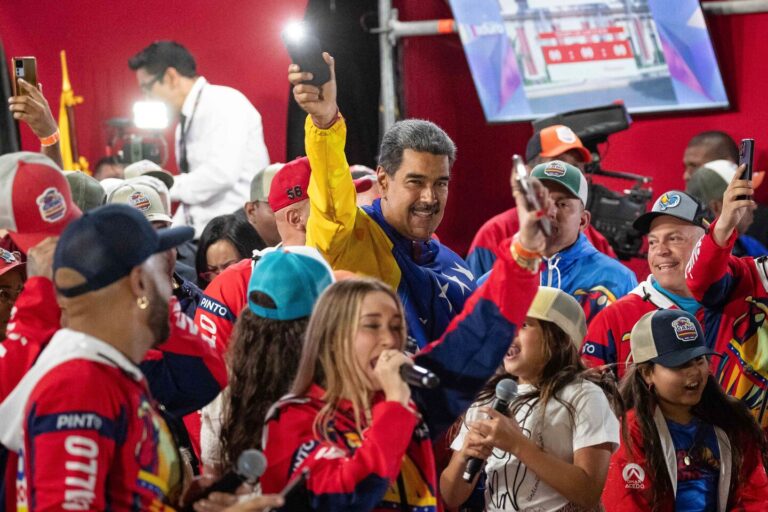Some Latin American countries, including Colombia, which has close ties with Maduro, expressed skepticism about the results, as did many European countries, including Spain and Italy. Russia, China, Iran, Cuba and others congratulated Maduro.
Venezuela’s pro-government electoral commission announced early Monday that Maduro had won 51 percent of the vote, to opposition candidate Edmundo Gonzalez’s 44 percent, after partial results were counted, though independent polls suggested Gonzalez received twice as many votes as Maduro. Maduro, an authoritarian socialist, has been in power since 2013 and many blame him for the collapse of oil-rich Venezuela’s economy and the exodus of millions of its citizens, including hundreds of thousands to the United States.
Gonzalez also declared victory late Sunday night, saying “the results are undeniable. The country has chosen peaceful change.”
“What is happening in our country is a huge social movement that they cannot stop,” Maria Corina Machado, a driving force behind Venezuela’s opposition movement, said at a press conference early Monday. “We are a civil peace movement and we will continue to work until the truth prevails. And the truth will prevail.”
As the election approached, Maduro’s government banned Machado, Venezuela’s most popular politician, from running, arrested campaign workers and blocked access to state media. There were reports of blockages, delays and violence at some polling stations on Sunday.
Maduro’s claim of victory in Sunday’s election risks further isolating him on the international stage. In 2018, he claimed victory amid allegations of fraud, sparking global condemnation and mass protests at home.
In a statement early Monday, Maduro claimed without evidence that the delay in releasing the full results of Sunday’s election was because the electoral commission was hacked by an unnamed country. “The devil, the evil spirits, did not want the totals to be counted,” Maduro said.
Latin American leaders from across the political spectrum questioned the results.
Colombian Foreign Minister Luis Gilberto Murillo called for an independent verification and audit of the vote tally “as soon as possible.”
Center-left President Gabriel Boric called the official results “hard to believe” and demanded that independent international monitors be allowed to see the full results. “Chile will not accept results that cannot be verified,” he wrote on Twitter early Monday.
Meanwhile, politically, Argentine President Javier Milley also refused to acknowledge the “fraud,” posting on Twitter that “the Venezuelan people have chosen to end the communist dictatorship of Nicolas Maduro.” The South American far-right leader called on the Venezuelan military to “protect democracy and the will of the people.”
Peruvian Foreign Minister Javier Gonzalez Olaechea accused the Maduro government of “deceptive intent” and said he had called Peru’s ambassador to Venezuela for consultations. “Peru will not tolerate the violation of the popular will of the Venezuelan people,” he said in a statement.
Costa Rica, Ecuador, Guatemala, Panama, Paraguay, the Dominican Republic and Uruguay also called for a transparent vote count with independent observers.
Meanwhile, Venezuela’s allies Russia, China, Iran, Cuba, Bolivia and Honduras sent messages of congratulations to President Maduro on the announced election results.
President Vladimir Putin congratulated Maduro after the Russian ambassador to Caracas called the electoral commission’s vote tally “trustworthy.” “Remember, on Russian soil you are always a welcome guest,” Putin said in his message to Maduro.
China’s Foreign Ministry congratulated Maduro and Venezuela on the “successful” elections. “China and Venezuela are good friends and mutually supportive partners,” Chinese state media quoted Foreign Ministry spokesman Lin Jian as saying at a news conference.
Cuba’s foreign ministry said Raul Castro, the country’s former communist leader and brother of the late Fidel Castro, had called Maduro to offer his congratulations.
On Sunday, voters waited in line for more than six hours to cast their ballot at a polling station in Caracas’s Chacao district, chanting, “I want to vote!” A Washington Post reporter witnessed a mob of hooded Maduro supporters punching and kicking people outside a polling station in Caracas who complained they had been denied access to the vote count.
New Jersey-based Edison Research interviewed more than 6,800 voters at 100 locations in exit polls after polls began closing on Sunday, finding that Gonzalez outperformed Maduro among both men and women, rural, suburban and urban voters and all age groups.
Sands reported from London. Christian Sheppard in Taipei, Taiwan, and Natalia Abakumova in Riga, Latvia contributed to this report.


